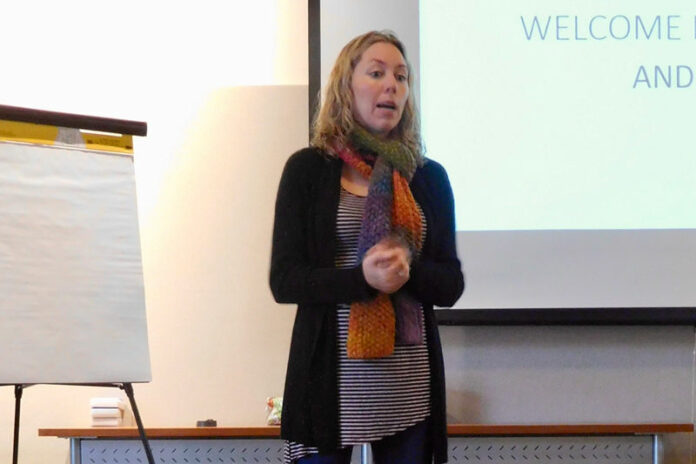
It may have been a defining moment last Saturday when Lower Russian River and Sonoma Coast Municipal Advisory Council (MAC) members all raised their arms in the “circle of joy” yoga position.
“Wrap the light of joy all around you like a blanket,” yoga instructor Kathleen Hardy instructed the dozen or so MAC members who braved feisty winds and rain to attend last Saturday’s gathering in the Monte Rio Community Center.
The unusual yoga exercise, a first even for the liberally enlightened west county, kicked off a daylong retreat for MAC members to mingle and ruminate on their advisory role for Fifth District Supervisor Lynda Hopkins and the Sonoma County Board of Supervisors.
Hopkins shared Saturday’s yoga moment before excusing herself to attend to a meeting in Santa Rosa.
“This is really about you guys,” Hopkins told the MAC. “This is about your leadership and your vision.”
The two MACs, comprising 31 members and alternatives, have been meeting since February to talk about the west county’s diverse political landscape and find common ground on which to proceed.
Hopkins made the formation of the river and coast municipal advisory councils a top priority in her 2016 election campaign, but no one said it would be easy herding the west county’s diverse collection of human feral cats. Last February’s Russian River flood disaster added to the challenge of improving government services to a chronically neglected rural area of the county.
“I want to acknowledge that any time you form a new committee or a new body, it’s going to be a little bit messy,” Hopkins said. “We don’t exactly know what we’re looking for. This is a first for everyone.”
Any new political entity “needs some time to kind of get its sea legs,” she said.
“I feel like the great thing is that you guys have been working together fantastically. You have your sea legs. There’s been a lot of education that’s taken place, both in the lower Russian River and in the coastal MAC,” with help from various county departments, Hopkins said. “My hope is that we’ve kind of reached the level of ‘OK, I think I know what I’m doing here. I can work with all of these people. I know them, I know my community.’”
The next step is “to really start to lead at the Lower Russian River MAC or at the Coastal MAC,” Hopkins said.
“My biggest hope is that what comes out of today is kind of a plan to empower both the Russian River and the coastal MAC to handle some really big topics next year,” Hopkins said.
Hopkins commended the MAC representatives for their help during the recent disasters, a major flood in February and the Kincade Fire and evacuation in October.
“I’m really grateful for the sort of pipeline you’ve created,” promoting communication “between all of the communities that you represent,and my office and all the county departments,” said Hopkins.
“I think that’s going to be a critical role of the MACs going forward,” Hopkins said. “I’m just going to knock on wood that we don’t get any major disasters again in the next few months.”
Anticipated local issues coming before the River MAC include the area’s critical shortage of affordable housing, vacation rentals squeezing out permanent residences and emergency evacuation issues for residents served by narrow road with limited access.
Public awareness of the MAC’s existence and increasing public participation in the MAC process also need more work, MAC members said last week.
More specific items for the River MAC’s attention might be Guerneville’s proposed gas station improvement project with a dozen new apartments on the Rio Nido Strip, and the fate of the summer bridges across the river in Vacation Beach and Odd Fellows Park.
The summer crossings were on this week’s Board of Supervisors agenda and will probably come up on the River MAC’s regular meeting next week, Dec. 19, at 5:30 p.m.
The river MAC is still in its first year following the worst Russian River flood disaster since 1995.
“I think it’s been difficult,” for the Lower River MAC to find its direction, said Pocket Canyon district representative Jeanette Dillman.
February’s flood hit just when the River MAC started to meet and since then, “We have just been dealing with disasters,” Dillman said, including October’s Kincade Fire, regional power shutoffs and mass evacuations. “We’ve been so concentrated on that, we’re a little behind on getting ourselves together as a solid working group.”
“I feel at this point we’re on the verge of dealing with something,” besides disaster, Dillman said. “We’re at a point where we’ve gotten through these disasters, and we want to move on.”







